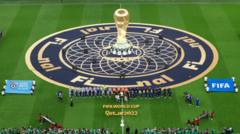“We are committed to ensuring that the World Cup is a tournament for all,” stated President Gianni Infantino, hinting at a transformative vision for the future of this prestigious event. As the global landscape of sports evolves, the urgency to adapt to the needs of diverse audiences becomes paramount. The World Cup, a pinnacle of international competition, faces increasing scrutiny over its accessibility, sustainability, and inclusivity. With millions of fans eagerly anticipating the next tournament, the question arises: how can FIFA enhance this monumental event to resonate with a broader audience while maintaining its revered traditions?
The stakes are undeniably high. The World Cup not only generates substantial economic impact but also serves as a cultural touchstone for nations worldwide. As the international community grapples with pressing issues such as climate change and social equity, FIFA’s discussions are timely and critical. The organization is exploring innovative strategies to elevate the tournament experience for fans, players, and host nations alike. This endeavor could redefine the essence of the World Cup, making it not just a sporting event but a unifying global celebration of diversity and resilience.
Reimagining the World Cup Experience
One of the primary focuses of FIFA’s discussions centers around enhancing the overall experience for fans attending the World Cup. Infantino emphasized the need for a more inclusive atmosphere, where every fan feels welcomed and valued. This vision includes improving accessibility for individuals with disabilities, ensuring that stadiums are equipped with necessary facilities, and that transportation options are efficient and user-friendly. By prioritizing these aspects, FIFA aims to create an environment where everyone can partake in the excitement of the tournament.
Moreover, the organization is considering the integration of advanced technology to enrich the fan experience. Innovations such as augmented reality and mobile applications could provide real-time updates, interactive features, and immersive content, allowing fans to engage with the tournament in unprecedented ways. For example, through a dedicated app, spectators could access behind-the-scenes footage, player interviews, and even virtual reality experiences that transport them closer to the action. This technological enhancement not only caters to the younger, tech-savvy audience but also ensures that the World Cup remains relevant in an increasingly digital world.
Ultimately, these initiatives reflect a broader trend in sports management, where organizations strive to create more engaging and personalized experiences for fans. By adopting a forward-thinking approach, FIFA can set a new standard for international sporting events, positioning the World Cup as a leader in fan engagement and inclusivity.
Environmental Sustainability Initiatives
As global awareness of climate change intensifies, FIFA recognizes the importance of incorporating sustainability into the World Cup framework. Infantino has underscored the organization’s commitment to reducing the environmental impact of the tournament. This includes implementing eco-friendly practices in stadium construction, waste management, and energy consumption. By prioritizing green initiatives, FIFA aims to set an example for future sporting events, demonstrating that large-scale competitions can coexist with environmental responsibility.
For instance, the upcoming World Cup will explore the use of renewable energy sources to power stadiums and surrounding facilities. Additionally, FIFA plans to collaborate with local governments and organizations to promote sustainable transportation options for fans, such as public transit and carpooling. These efforts not only aim to minimize carbon footprints but also encourage fans to adopt more environmentally conscious habits during their attendance.
The implications of these sustainability initiatives extend beyond the tournament itself. By championing environmental responsibility, FIFA can inspire other sporting organizations to follow suit, fostering a culture of sustainability within the sports industry. This shift could lead to a significant reduction in the overall environmental impact of major events, ultimately benefiting the planet and future generations.
Enhancing Global Inclusivity
FIFA’s commitment to inclusivity extends beyond the fan experience; it also encompasses the players and nations represented at the World Cup. Infantino has highlighted the need for the tournament to reflect the rich diversity of cultures and backgrounds present in the global football community. This vision includes ensuring equitable opportunities for all nations, regardless of their historical success in the sport.
One potential strategy involves expanding the number of teams participating in the tournament. By increasing the representation of underrepresented nations, FIFA can foster a more competitive environment while showcasing a wider array of talent. This change could not only enhance the tournament’s appeal but also inspire a new generation of players from diverse backgrounds to pursue their dreams in football.
Furthermore, FIFA is exploring initiatives that promote gender equality within the sport. By investing in women’s football and creating pathways for female athletes to compete on the world stage, the organization can contribute to breaking down barriers and challenging stereotypes. This commitment to inclusivity could have a profound impact on the sport, encouraging greater participation and support from diverse communities worldwide.
The Path Forward for Fifa
As FIFA embarks on this ambitious journey to reimagine the World Cup, the organization faces both challenges and opportunities. The discussions led by Infantino signal a willingness to adapt and innovate in response to the evolving needs of fans and players alike. However, successfully implementing these changes will require collaboration with stakeholders, including national federations, sponsors, and local communities.
Moreover, transparency and communication will be essential as FIFA navigates this transformative period. Engaging with fans and soliciting their feedback will not only foster a sense of ownership but also ensure that the changes resonate with the very people the tournament aims to serve. By prioritizing dialogue and inclusivity, FIFA can build a stronger connection with its global audience.
The potential for the World Cup to evolve into a more inclusive, sustainable, and engaging event is immense. As FIFA continues its discussions, the world watches with anticipation, eager to see how these changes will shape the future of one of the most beloved sporting events on the planet. The journey ahead is undoubtedly challenging, yet the rewards of creating a World Cup that truly reflects the spirit of unity and celebration are worth the effort.


